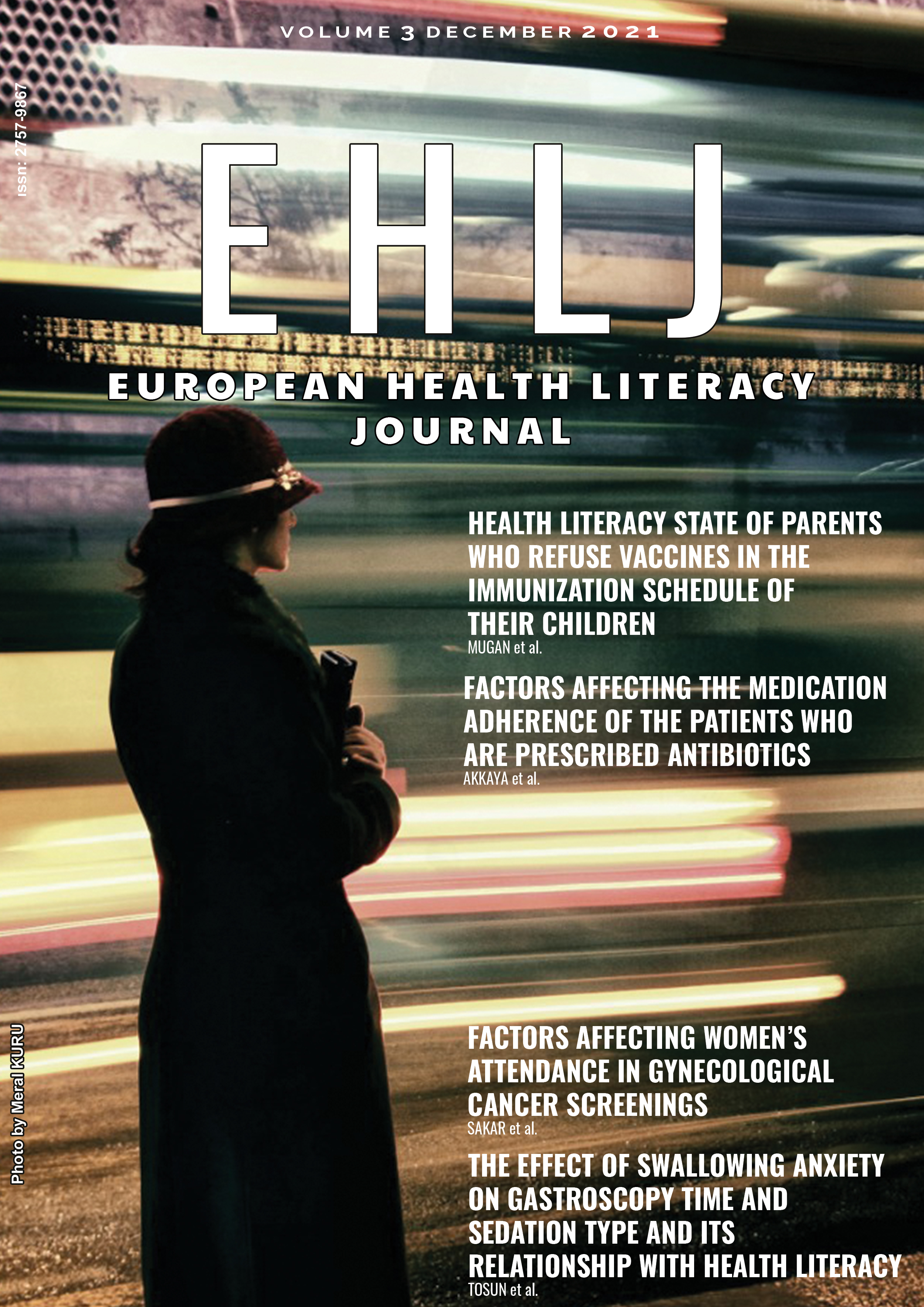Author :
Abstract
Keywords
Abstract
Aim: In this study, our aim is to investigate the antibiotics adherence of the patients who are prescribed antibiotics.
Methods: This study was conducted on 353 patients between age 18-75 who were prescribed antibiotic and who were registered to Bursa Nilüfer 23 Nisan Family Health Center No: 34 between dates 01.10.2018- 30.09.2019, following the ethics committee approval. In order to collect data in this study, beside the medical history, Socio-demographic Data Form, Morisky Medication Adherence Scale and short version of European Health Literacy Scale which questioned their antibiotics adherence were applied to the patients.
Results: Medication utilization loyalty was detected significantly higher in the participants with high health literacy. The disease for which antibiotics were most frequently prescribed was upper respiratory infection (32.3%). It was followed by lower respiratory infections (23.5%), acute sinusitis (13%) and urinary tract infections (7.6%) respectively. Most commonly prescribed antibiotics were Cephalosporines (32.3%), Penicillin (29.5%) and Macrolides (23.2%). The most common side effect was diarrhea (30.4%). Whereas high adherence rate was significantly high in the patients without fever, medium adherence rate was detected significantly higher in patients with fever. Percentage of high adherence was significantly high in case the antibiotic was recommended by the family physician.
Conclusions: Antibiotic adherence is quite high in our region. Health literacy levels of the patients are associated with their medication adherence. High education level of our region enabled us to work with a more conscious patient portfolio. Antibiotics recommended by the family physicians were used more regularly. Family physicians must behave more carefully about rational drug use, must have a full knowledge of the guides and must meet the requirements of modern medicine.
Keywords
- Yaygınlaştırılması ve Tıp Eğitiminin Rolü. DEÜ Tıp Fakültesi Dergisi. 2012; 26: 57 -63.
- 2. Altindis S. Akılcı İlaç Kullanımına Sistematik Bir Bakış Journal of BSHR 2017; 1: 34-38.
- Üniversitesi Sosyal Bilimler Enstitüsü Dergisi. 2021; (27): 92-105.
- 4. TÜİK, A. Y. A. (2012). Türkiye İstatistik Kurumu Matbaası.
- 5. WHO, 1998. World Health Organization Health Promotion Glossary. Geneva.
- Üniversitesi Hemşirelik Fakültesi Dergisi. 2016; 3: 44-
- medication adherence. Med Care. 1986; 24: 67-74.8. Bahar G , Sava HA , Ünal A , Sava E , Kaya H ,Bahar A . Reliability and validity of the Morisky
- Medication Adherence Scale for bipolar mood disorder. Anatolian J Psychiatry 2014; 15:141-9 .
- 9. HLS-EU Consortium . Comparative report ofhealth literacy in eight EU member states. TheEuropean health literacy survey HLS-EU. 2012.
- 10. Emiral, G. O., Aygar, H., Isiktekin, B., Göktas, S.,Dagtekin, G., Arslantas, D., &Unsal, A. Health literacyscale-European union-Q16: a validity and reliabilitystudy in turkey. Int. Res. J. Med. Sci. 2018; 6: 1-7.11. Çöplü N, İlhan MN, Ciliv EF, Şenlik ZB, Ertek M. Aile hekimleri ve uzmanlar arasında
- Antimikrobiyallerin akılcı reçetelendirilmesi: tutum vetalepler. Turk Hij Den Biyol Derg. 2014; 71: 19-26.12. Şaşmaz T, Buğdaycı R, Kurt AÖ, Tezcan H.Mersin’de bir merkez Sağlık Ocağında Akut
- Antibiyotiklerin İncelenmesi, Mersin Üniversitesi Tıp Fakültesi Derg. 2002; 3: 185-190.
- 13. Döşler S, Ulusoy A. AkılcıAntibiyotikKullanımı:İstanbul’danBirÖrnekTurkiyeKlinikleri J Pharm Sci 2014;3:55-64.
- 14. Öncü S. Antibiyotiklerin İstenmeyen Etkilerininİzlemi Yönetimi. ANKEM Derg 2013; 27: 82-84.15. Kukula O. Tıp Fakültesi Öğrencilerinin AntibiyotikKullanımının Değerlendirilmesi Ortadogu Tip Dergisi. 2019; 11: 239-243.
- Uyumun Değerlendirilmesi. 2018; 3: 113-121.17. Incesu E. Akılcı ilaç kullanımında sağlık
- üzerine bir araştırma. Sağlık Akademisyenleri Dergisi. 2017; 4: 28-38.
- Belirlenmesi: Kahramanmaraş İli Örneği. (Yüksek Lisans Tezi) 2018: 42-68.
- diabetes mellitus and hypertension. Canadian Family Physician. 2013: 59: 93-100.
- medications. Canadian Family Physician. 2007; 53: 2144-2145.





